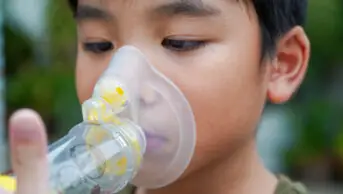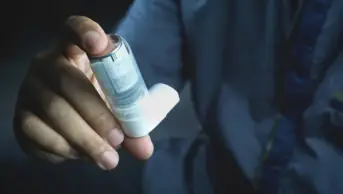
Shutterstock.com
Short-acting beta2 agonists (SABA), or ‘reliever’, inhalers should not be prescribed without inhaled corticosteroids to anyone diagnosed with asthma, according to the first UK-wide guidance for the diagnosis and management of chronic asthma.
The guidance — ‘Asthma: diagnosis, monitoring and chronic asthma management (BTS, NICE, SIGN)’ — jointly published on 27 November 2024 by the British Thoracic Society (BTS), National Institute for Health and Care Excellence (NICE) and Scottish Intercollegiate Guidelines Network (SIGN), is the first collaboration of its kind between the bodies.
The guidance also recommends that all patients aged over 12 years who have been diagnosed with asthma for the first time should be prescribed a low-dose combination of inhaled corticosteroids (ICS) with formoterol to reduce inflammation and relieve symptoms.
This recommendation, published in a statement alongside the guideline, was included because the independent guideline committee “looked at evidence which showed using the combined ICS and formoterol inhalers when required led to people suffering fewer severe asthma attacks”.
The guidance says healthcare professions must use “simple tests” in the first diagnosis of chronic asthma, including the breath test FeNO and the measurement of eosinophil cells in the blood, “as well as traditional tests like spirometry or peak flow measurements”.
The publication of the guideline follows a consultation on draft guidance, which closed on 30 July 2024.
Jonathan Benger, chief medical officer and interim director of the centre for guidelines at NICE, said the joint guidance is aimed to “help ease the pressure on the health service by reducing hospital admissions due to asthma and lowering the use of less-effective monitoring tests“.
“Having one clear set of national asthma guidelines is vital to ensure people receive consistent and effective asthma care across the health service, so people across the UK receive the right diagnosis and treatment for them,” he added.
Angela Timoney, chair of the SIGN Council, said the new guideline was “based on rigorous appraisal of the evidence and will change and improve asthma care”.
Paul Walker, chair of the BTS, said the recommendations would “simplify diagnostic processes and help with current diagnostic delays for adults, children and young people”.
“The treatment changes represent a true pivot in the principles of asthma care and will contribute to improved outcomes.”
Toby Capstick, consultant pharmacist in respiratory medicine at Leeds Teaching Hospitals NHS Trust, said the guideline “reduces confusion for healthcare professionals in determining which guideline to follow”, adding that it represents a “significant change in the way that we will manage asthma”.
“The guidelines have made a strong recommendation to stop prescribing SABA inhalers without inhaled corticosteroids,” he added.
“This is a welcome recommendation as SABA inhalers only relieve symptoms and do not treat the underlying cause of asthma. We know that regular use of blue SABA inhalers can actually increase airway inflammation and is associated with an increased risk of asthma attacks.
“Using ICS/formoterol inhalers as maintenance and reliever therapy (or as reliever therapy only in people with very occasional asthma symptoms) will be a change in practice for many healthcare professionals, but is an opportunity we must embrace as they are the most cost-effective way to prevent asthma attacks, and reduce the risks of asthma for our patients.”
Around 5.4 million people in the UK have asthma. In April 2024, the charity Asthma + Lung UK called upon the government to introduce national targets to end preventable asthma deaths, saying that a survey of 8,766 people found that 69% of people were not receiving basic asthma care: an annual asthma review, an inhaler technique check and a written asthma action plan.


